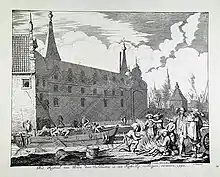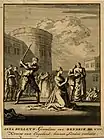Jan Luyken
Johannes or Jan Luyken (16 April 1649 – 5 April 1712) was a Dutch poet, illustrator, and engraver.[1]

Biography


He was born and died in Amsterdam, where he learned engraving from his father Kaspar Luyken.[1] He was a child prodigy.[2]
Luyken married at 19 and had several children, including renowned engraver Caspar Luyken.[1] At age 26 Luyken converted to the Mennonite church, which inspired him to write moralistic poetry.[1]
Works
Luyken illustrated the 1685 edition of the Martyrs Mirror with 104 copper etchings. Thirty of these plates survive and were part of The Mirror of the Martyrs exhibit.[3]
He also published Het Menselyk Bedryf ("The Book of Trades") in 1694, which contains numerous engravings of 17th-century trades by Luiken and his son Caspar (Caspaares).
Cultural references
Joris-Karl Huysmans' anti-hero Des Esseintes in À rebours was an admirer of Luyken's engravings and had prints from his Religious Persecutions hung in his boudoir. He described them as "a collection of appalling plates displaying all the tortures which religious fanaticism has invented." Des Esseintes was enthralled not just by Luyken's graphic depictions but his ability to reconstruct times and places in his works.
Gallery
 Jesus the Teacher
Jesus the Teacher
 Serious mistreatment of Christian slaves by the Turks
Serious mistreatment of Christian slaves by the Turks Turk and clergyman with Christian slaves (1684)
Turk and clergyman with Christian slaves (1684) The Cruelty of Shah Safi (1697)
The Cruelty of Shah Safi (1697) Anne Boleyn's Execution
Anne Boleyn's Execution_(cropped).png.webp) Alexander Farnese marries Maria Princess of Portugal (1720)
Alexander Farnese marries Maria Princess of Portugal (1720)
Notes
- Kort verhaal Van het godvruchtig leven En zalig afsterven Van Joannes Luiken (Short story of the religious life and peaceful death of Joannes Luiken) in the DBNL
- Spufford, Margaret (1995). "Literacy, trade and religion in the commercial centres of Europe". A Miracle Mirrored: The Dutch Republic in European Perspective. Cambridge University Press. p. 234. Retrieved 13 September 2023.
- "The Mirror of the Martyrs". Bethel College. Archived from the original on December 28, 2007. Retrieved December 24, 2007.
External links
![]() Media related to Jan Luyken at Wikimedia Commons
Media related to Jan Luyken at Wikimedia Commons
- Works by or about Jan Luyken at Internet Archive
- Works by Jan Luyken at LibriVox (public domain audiobooks)
